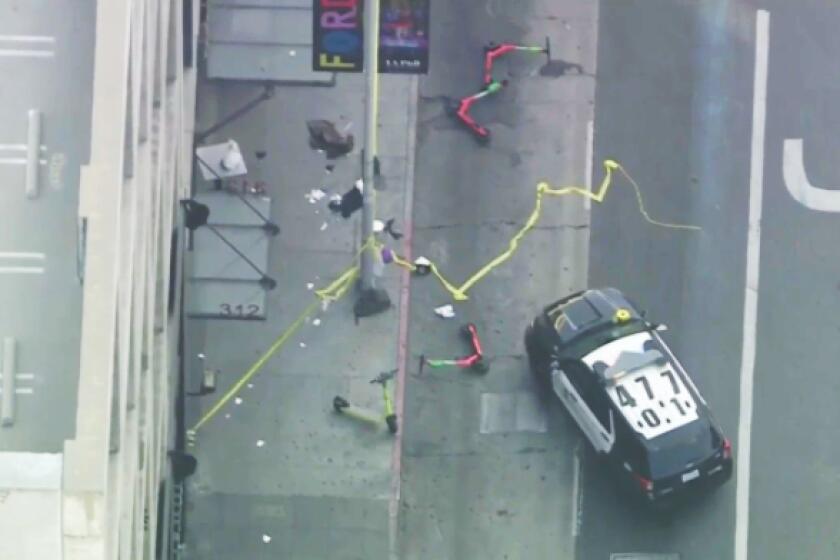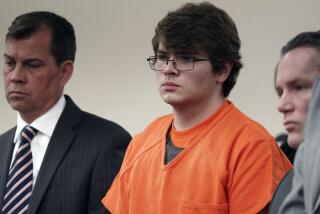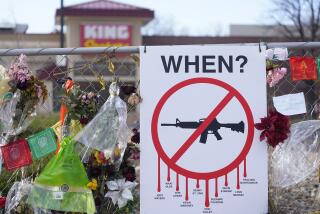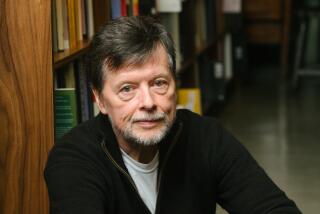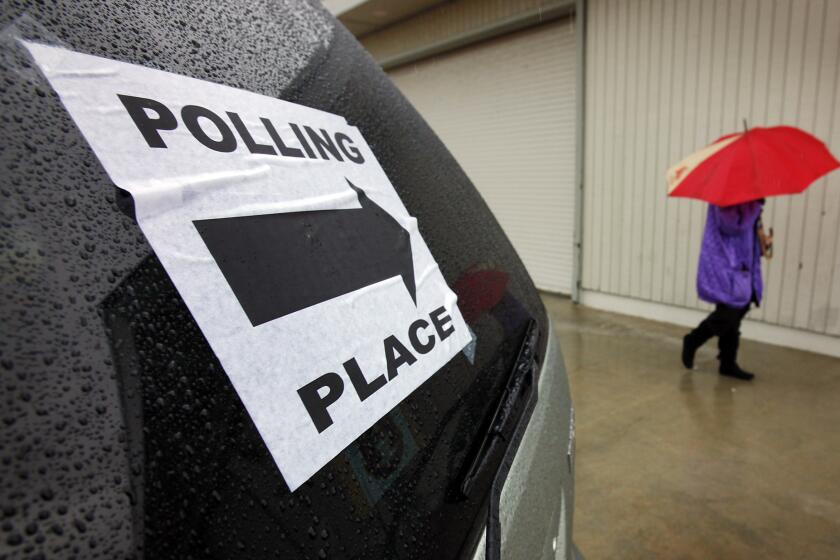Buffalo shooting that killed 10 investigated as ‘racially motivated violent extremism’
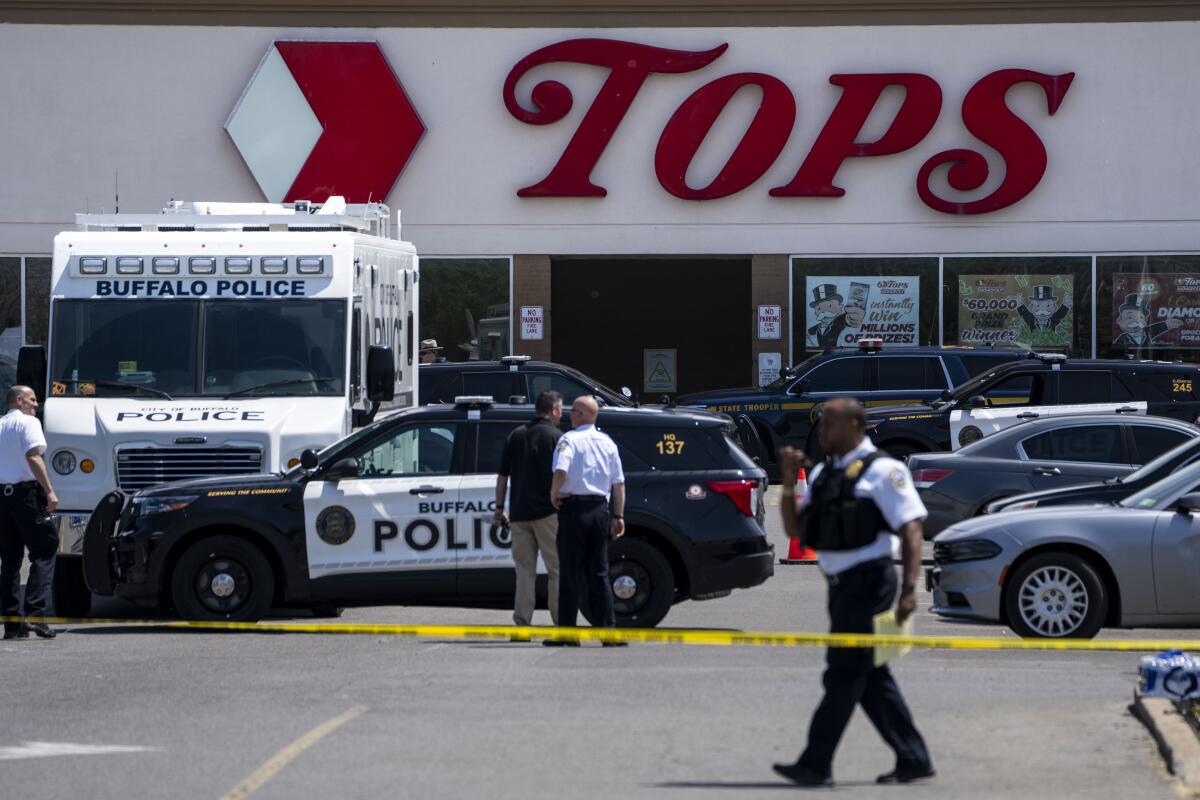
BUFFALO, N.Y. — As Buffalo residents expressed horror, anger and grief Sunday over a mass shooting that left 10 people dead at a grocery store in a predominantly Black neighborhood, local and federal officials said they were investigating the attack by a young white gunman as a hate crime and an act of “racially motivated violent extremism.”
Authorities said the suspect researched the demographics of the neighborhood around the Tops Friendly Markets store while searching for areas with a high concentration of Black residents. The gunman drove about 200 miles to Buffalo at least a day in advance to conduct reconnaissance on the store, police said.
The attack was a painful reminder of the fragility of life in America, where everyday moments — working a Saturday shift, taking a friend to buy groceries, picking up a cake for a child’s birthday — can end in tragedy.
The Buffalo shooting also echoed previous racist mass killings by young alienated white men, including the 2015 attack at a South Carolina church that left nine Black churchgoers dead; the 2019 massacre at a Walmart in El Paso that has been described as one of the deadliest attacks on Latinos in modern U.S. history; and the shootings at three Atlanta spas last spring in which the gunman targeted Asian women.
The killings have jolted a post-George Floyd America at a time when identity politics is further dividing the nation over race and immigration. The massacre in Buffalo again exposed how generations of discrimination are being exacerbated by new, well-armed extremists who have uploaded old racial hatreds for a new world.
Investigators said the suspect — Payton Gendron, 18, who has been charged with first-degree murder — had visited multiple websites that espoused hateful, white supremacist ideologies. A document said to have been written by Gendron before the attack echoed the far-right conspiracist view known as the “great replacement theory,” which claims that white Americans are at risk of being “replaced” by people of color through changing immigration and birth rates.
Gendron had also studied the 2019 mosque shootings in Christchurch, New Zealand, in which an avowed white supremacist shot dead 51 people; and the 2011 attacks in Norway carried out by a right-wing extremist who killed 77 people, investigators said.
Gendron, who pleaded not guilty in a courtroom arraignment Saturday evening, livestreamed the massacre with a helmet camera, police said. He eventually shot 11 Black people and two white people, police said.
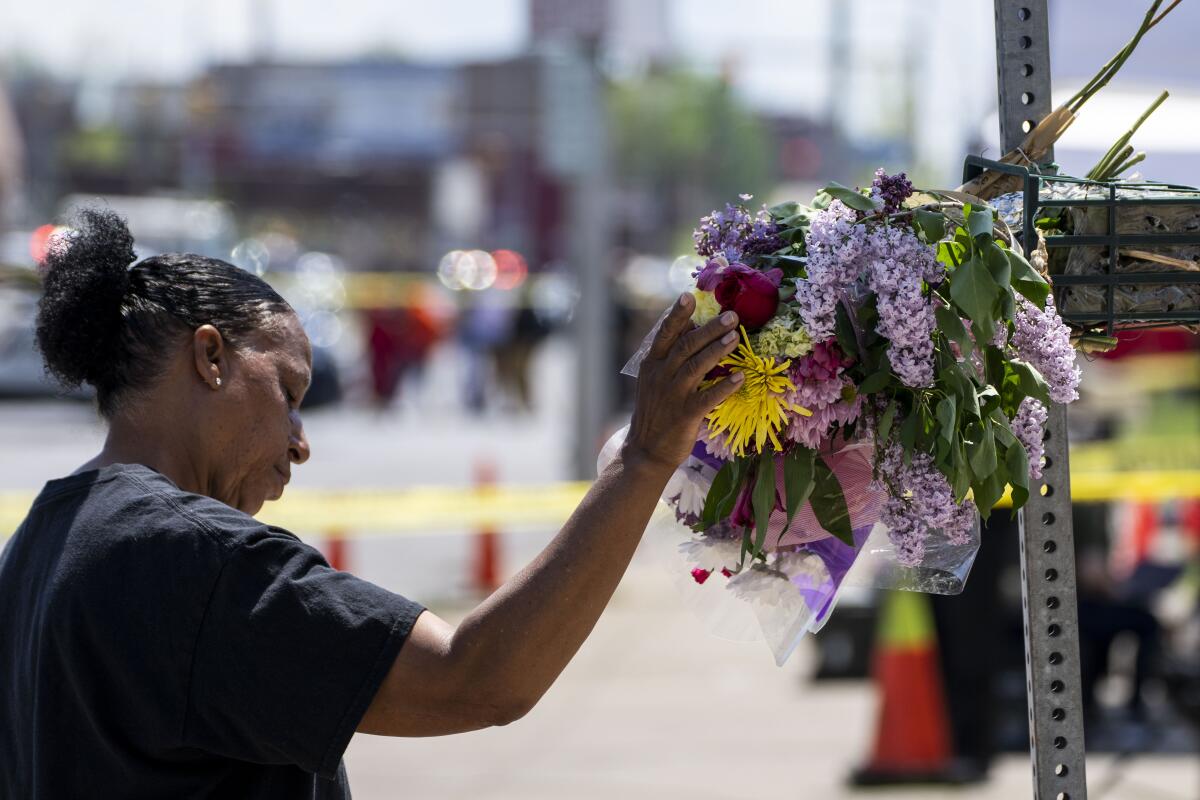
President Biden on Sunday described the shootings as “a racially motivated act of white supremacy and violent extremism.” As the Justice Department conducts its investigation, he said, “we must all work together to address the hate that remains a stain on the soul of America.”
Later in the day, the White House announced plans for the president and First Lady Jill Biden to travel to Buffalo on Tuesday to “grieve with the community.”
The shooting was reported at 3:56 in the 300 block of South Hill Street, Los Angeles Police said.
The shooting — the latest in a country rocked by police killings of Black Americans, a wave of gun violence, nearly 1 million deaths from the COVID-19 pandemic and a recent surge in hate crimes — left Buffalo residents and officials furious.
“This is someone who has hate in their heart, soul and mind,” Buffalo Police Commissioner Joseph Gramaglia said. He described the gunman as an outsider who “brought this kind of hate to our very close-knit Buffalo community.”
Police had been aware of Gendron because he had previously threatened a shooting at his high school.
Spokesman Beau Duffy with the New York State Police said troopers were called to Susquehanna High School in Conklin in June after receiving a report that a 17-year-old had made a threatening statement. The statement did not target a particular person, he said.
The student was placed in custody under a state mental health law and taken to a hospital for an evaluation, he said. For privacy reasons, he said, the police do not confirm or reveal the “identity of people who are taken into custody under the mental health law and are not charged criminally.”
Gramaglia said Gendron was at a hospital for about a day and a half. State police did everything they could under the law, he said.
Outside Gendron’s parents’ home in Conklin, on a dead-end street just across from the meandering Carlin Creek, a brightly lighted tent had been erected by law enforcement Sunday, probably to shield investigative activity from public view.
At Tops on Sunday, dozens of people gathered to talk, hug and cry. Some advocated unity and understanding. A woman with a bullhorn called on the crowd to fight for a better future.
“People grieve differently,” said Buffalo resident Rhys Hall, who said he took a friend regularly to the market, and whose father grew up in the neighborhood nearby. “Some people are all kumbaya right now. And some people are like, ‘Nah, f— that.’ This is what white supremacy does and it’s OK to say that.”
Hall said the incident felt like “some Black America rite of passage,” a reminder that for Black Americans, hate can strike anywhere.
“The North is a lie,” Hall said. “My people migrated up here thinking it was different. And that was wrong.”
Tops is like “the community store” for the neighborhood, said JeanPaul Minani, who lives a few blocks away. He said people who live nearby had loved ones killed Saturday.
“This is a small city, and I never thought this kind of thing would happen here,” said Minani, 23, who emigrated from Tanzania to the U.S. as a child.
Authorities late Sunday identified the 10 people killed and three people injured.
Those killed were Roberta Drury, 32; Margus Morrison, 52; Andre Mackneil, 53; Aaron Salter, 55; Geraldine Talley, 62; Celestine Chaney, 65; Heyward “Tenny” Patterson, 68; Katherine Massey, 72; Pearl Young, 77; and Ruth Whitfield, 86.
Patterson was shot as he worked as a volunteer, loading groceries in the parking lot, his wife, Tirzah Patterson, said.
Security guard Aaron Salter, a retired lieutenant with the Buffalo Police Department, fired at the gunman multiple times, but the bullets did not penetrate the shooter’s body armor, the police said. Salter was a “true hero” who may have prevented the gunman from hurting more people, Gramaglia said.
The shooting is “another lynching,” the latest in a long history of white supremacist violence against Black people, said Buffalo resident Leslie Gardner, 63, who has lived in the majority-Black neighborhood near the Tops store since she was born.
The attack, she said, recalled the South Carolina church shooting that left nine Black people dead. The white supremacist who carried out that attack, then-21-year-old Dylann Roof, wrote in his journal in jail that he had hoped to incite a race war, according to federal court testimony.
“We’ve heard it from our parents and our grandparents that this is our legacy, our legacy of survival, our legacy of being abused and brutalized,” Gardner said. “We need healing, and it is going to take months, years, for us to heal. Every time we pass the store, we’ll think of it.”
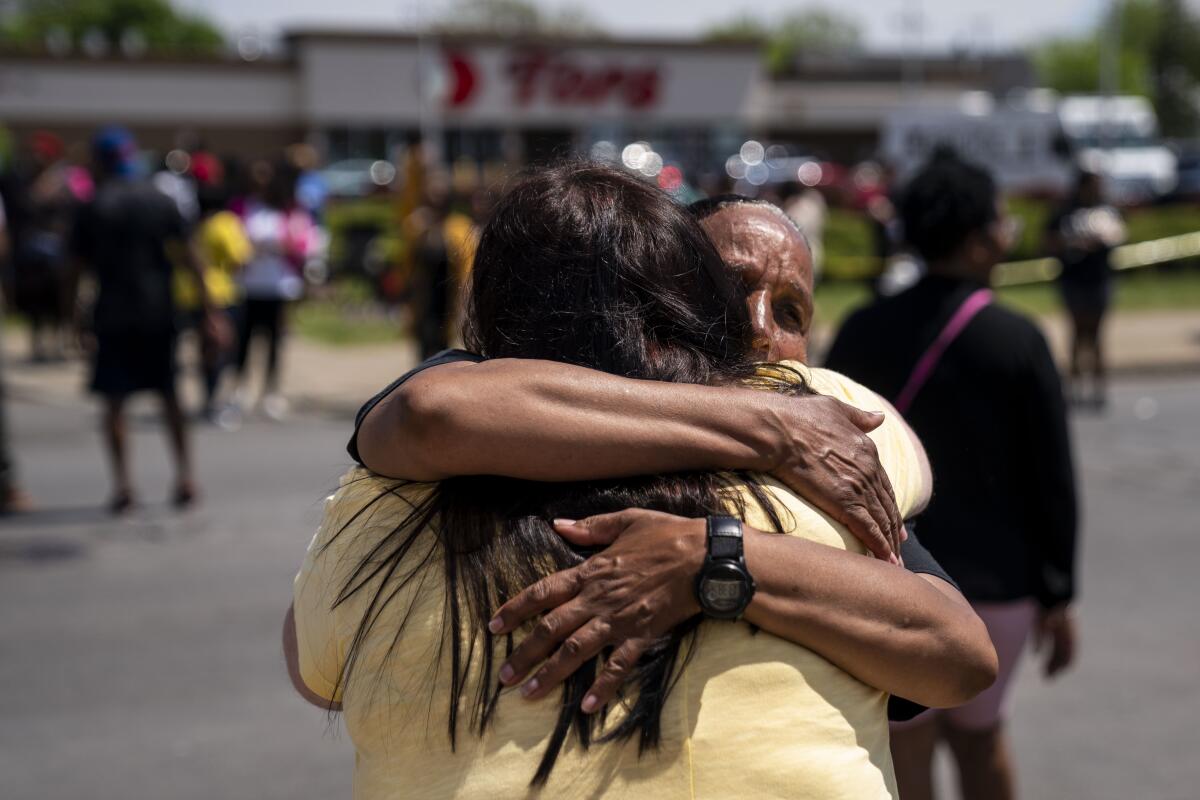
The gunman fired more than 50 rounds, and his primary weapon was a Bushmaster XM-15, a semiautomatic rifle, law enforcement sources told The Times.
About 20 people saw the livestream the suspect launched on the broadcasting app Twitch, the Amazon-owned streaming platform popular with video gamers, law enforcement said. The company shut down the stream and removed the video less than two minutes after the suspect began shooting, and said in a statement that it is monitoring for any accounts that try to rebroadcast the video.
But the video remained easy to find Sunday on a number of social media platforms, including Facebook and Twitter. Some posts containing the video or clips of the video were taken down, but many remained, along with posts that linked to outside websites hosting the video in full.
New York Gov. Kathy Hochul, a Buffalo native, said Sunday that tech executives need to be “held accountable, and assure all of us that they’re taking every step humanly possible” to monitor the spread of hate speech online.
“How these depraved ideas are fermenting on social media — it’s spreading like a virus now,” she said on ABC News. A lack of oversight could encourage others to emulate the shooter, she said.
Maurice Mitchell, national director of the Working Families Party, said alt-right and white nationalist ideologies have entered the mainstream in recent years, circulating on not only online message boards like 4chan, but also large conservative news outlets like Fox News. The continued “radicalization” of young, disaffected young men by messages meant “to stoke the flames of white resentment to stoke the flames of racial paranoia” worries him, he said.
“This was predictable,” he said. “It was only a matter of time. This will happen again. The ‘lone wolf’ is a byproduct of a strategy of radicalizing young white men across the country to advance this movement.”
Rick Banks, a law professor and cofounder of the Stanford Center for Racial Justice, said racist fringe groups are a “long-standing feature of American society,” but the internet, along with access to guns, has fueled a specific kind of violence where extremists can “fortify each other” and think of each other as “righteous warriors.”
“It’s a mistake to individualize these incidents and to think that if we would’ve uncovered this one wrongdoer, we would have done our job,” Banks said. “All of these shootings are connected even if they don’t overtly connect themselves to each other. That’s the hard thing for us to see. The reality is the circumstances that produce these people are the problem, and those circumstances have to do with our history and culture and current inequalities and politics.”
Sheets reported from Conklin and Buffalo, N.Y., Nelson and Jany from Los Angeles, and Mays from Sacramento. Times staff writers Richard Winton, Louis Sahagún, Sam Dean and Andrew J. Campa in Los Angeles, Nolan D. McCaskill in Buffalo and Molly Hennessy-Fiske in Houston contributed to this report.
More to Read
Sign up for Essential California
The most important California stories and recommendations in your inbox every morning.
You may occasionally receive promotional content from the Los Angeles Times.
